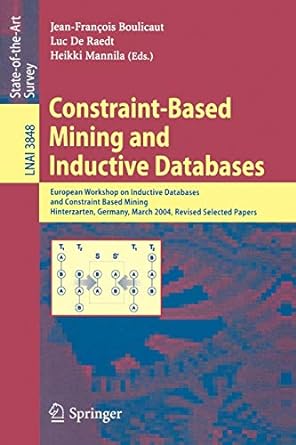Question
Consider the following two high level programs that are executed concurrently. Some system level events occurred during the execution of each. Follow the example for
- Consider the following two high level programs that are executed concurrently. Some system level events occurred during the execution of each. Follow the example for process state transitions, add the events that occur during execution (in addition to the ones that are given). Instruction: Fill in the events with your answer which are followed by ?. Write your answer after ?. DONT DELETE ?
Program P:
{
read(x);
compute factorial of x;
print(x);
pid = fork();
if (pid == 0)
{
read(y);
compute factorial of y;
print(y);
}
else /* parent process */
wait (pid);
-- while waiting, child processs read (y) is done
-- while waiting, child processs print (y) is done
}
Program Q:
{
initialize matrix A using random number generator;
-- I/O interrupt: Ps read (x) operation is done
initialize matrix B using random number generator;
-- I/O interrupt: Ps print (x) operation is done
create a thread to compute A*B;
}
Your Answer
-- Event: user runs the program ready
Program P;
{
-- Event: scheduled to run running (context switch)
read (x);
-- Event: I/O statement blocked
Switch to execute another process (context switch)
-- Event: scheduled to run running (context switch)
compute factorial of x;
print (x);
-- Event: ?
-- Event: ?
pid = fork ();
-- Event: system call Blocked
Switch to kernel mode to handle fork (context switch)
OS creates the child process, put it in ready queue
Switch back to run parent process in user mode (context switch)
if (pid == 0)
-- Event: Event: scheduled to run childe process running (context switch)
{ read (y);
-- Event: ?
-- Event: scheduled to run running (context switch)
compute factorial of y;
print (y);
-- Event: I/O statement blocked
Before blocked, switch to kernel mode to handle read
Switch to execute another process (context switch)
-- Event: scheduled to run running (context switch)
Child process terminates, switch to another process
}
else /* parent process */
wait (pid);
-- Event: ?
-- while waiting, child processs read (y) is done
-- Event: CPU switches to interrupt handler and put child process in ready state
-- while waiting, child processs print (y) is done
-- Event: ?
}
-- Event: user runs the program ready
Program Q;
{
-- Event: scheduled to run running (context switch)
initialize matrix A using random number generator;
-- I/O interrupt: Ps read (x) operation is done
-- Event: CPU switches to interrupt handler and put P in ready state
-- Event: CPU continue to execute the original running process
initialize matrix B using random number generator;
-- I/O interrupt: Ps print (x) operation is done
-- Event: ?
-- Event: ?
create a thread to compute A*B;
-- Event: Nothing, since it is a user level thread
}
Step by Step Solution
There are 3 Steps involved in it
Step: 1

Get Instant Access to Expert-Tailored Solutions
See step-by-step solutions with expert insights and AI powered tools for academic success
Step: 2

Step: 3

Ace Your Homework with AI
Get the answers you need in no time with our AI-driven, step-by-step assistance
Get Started


